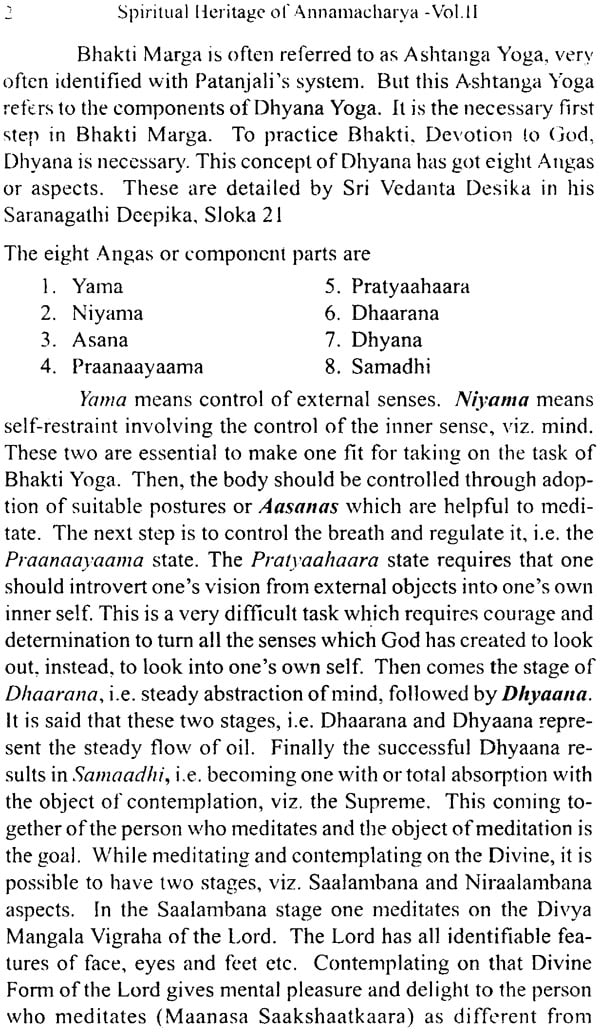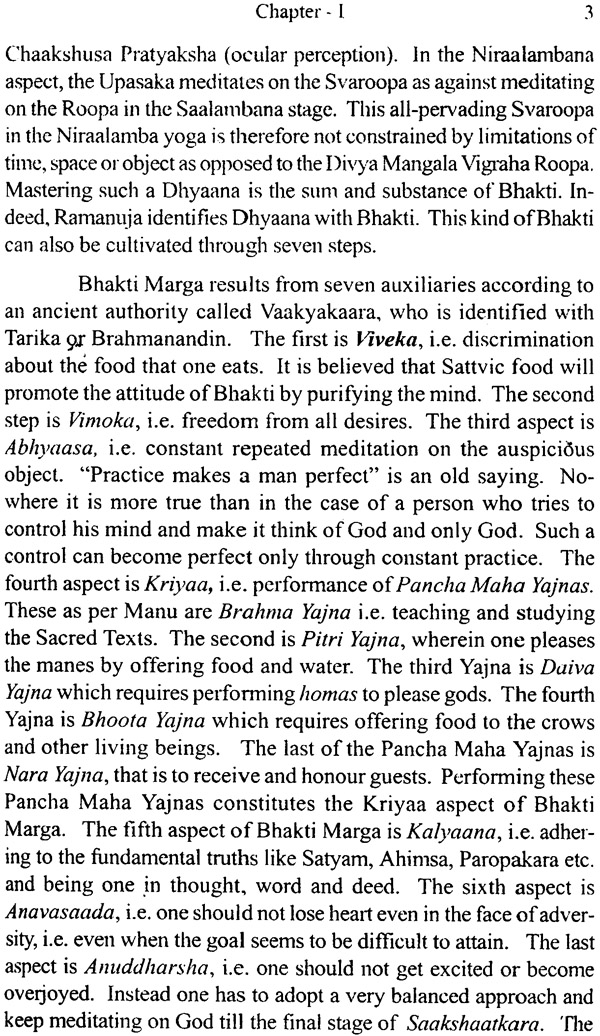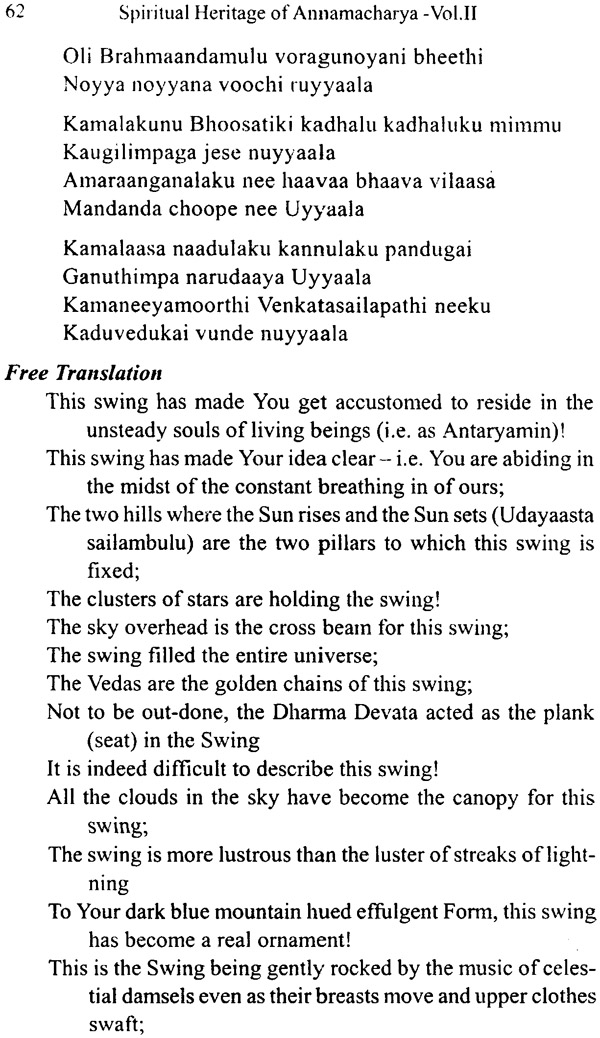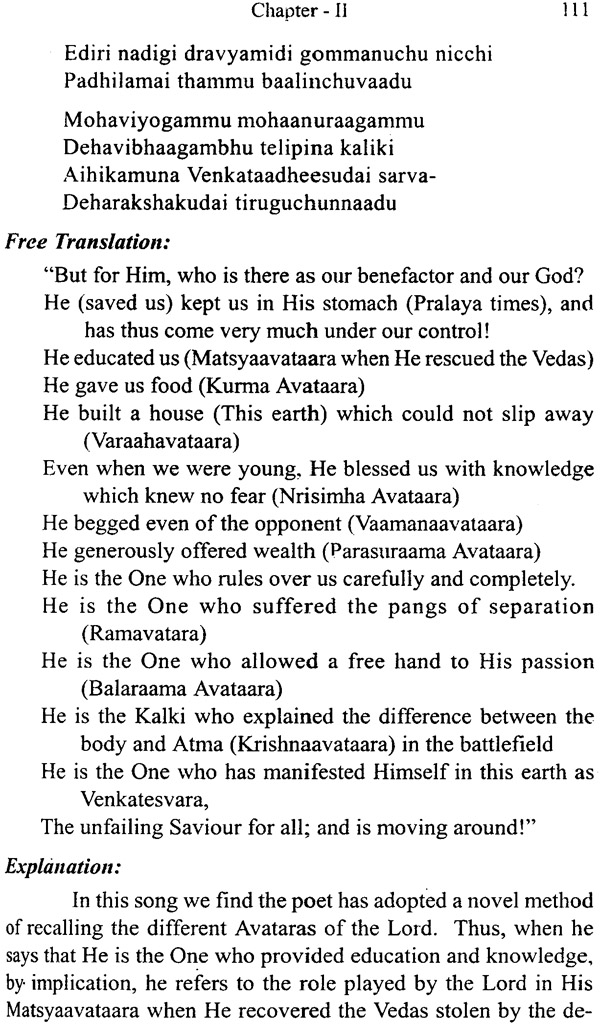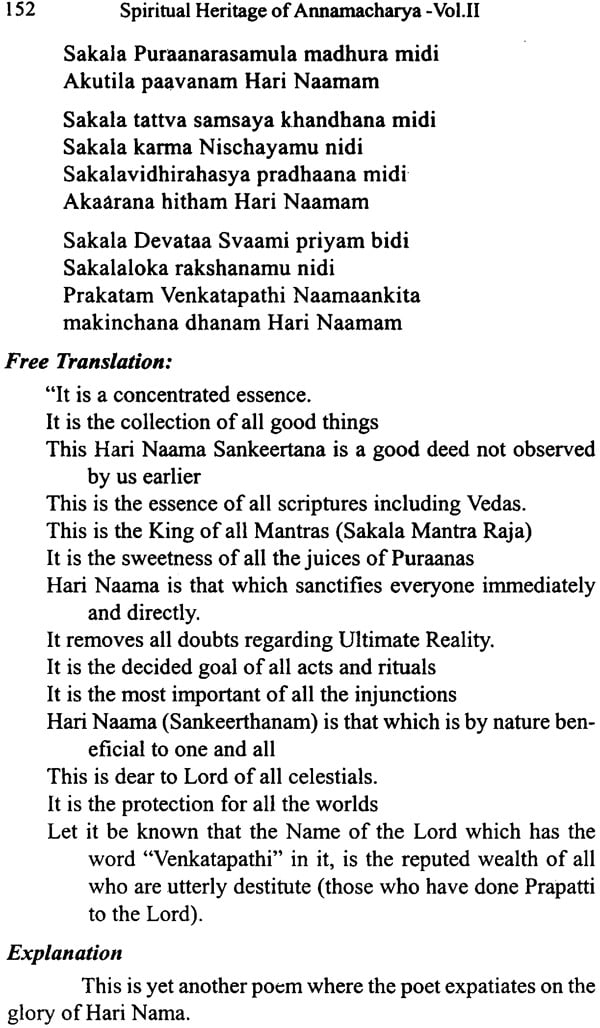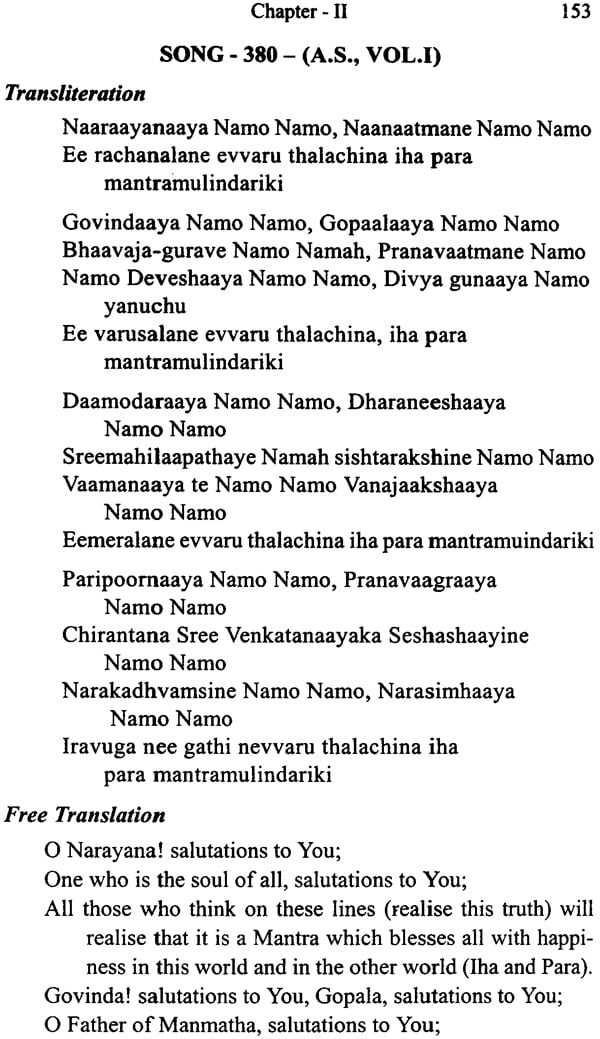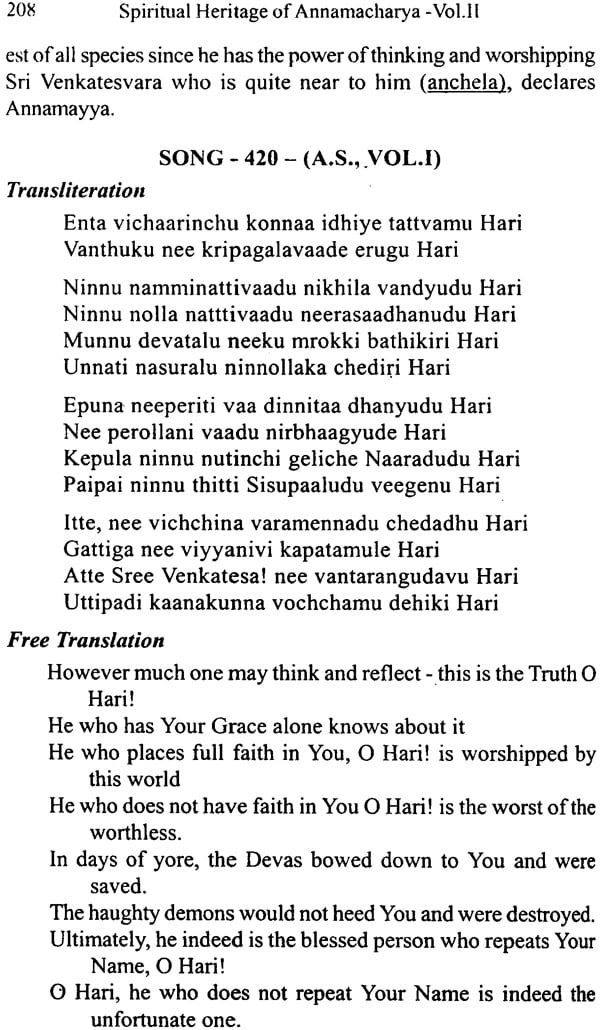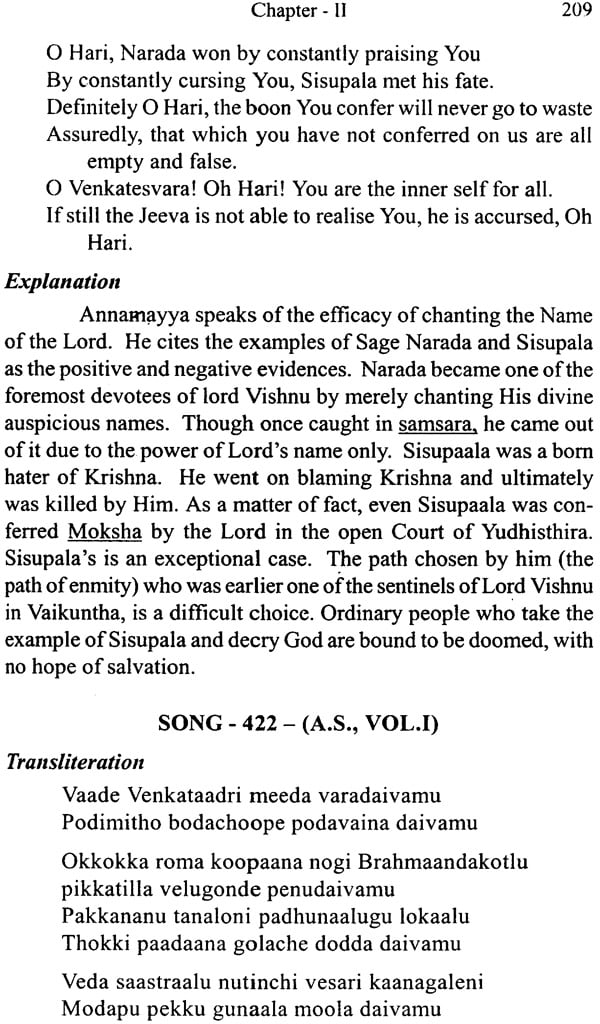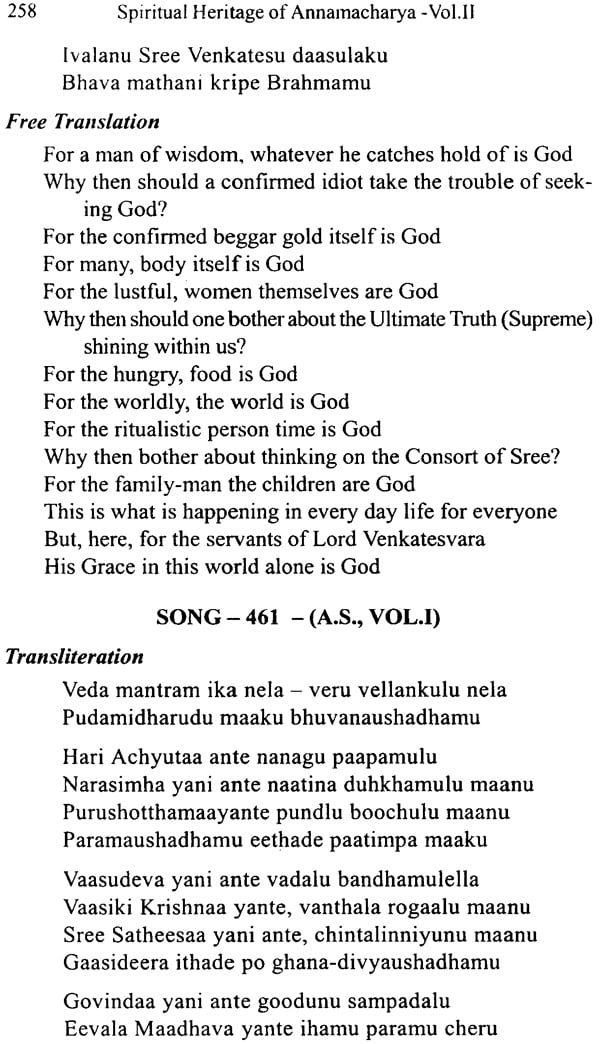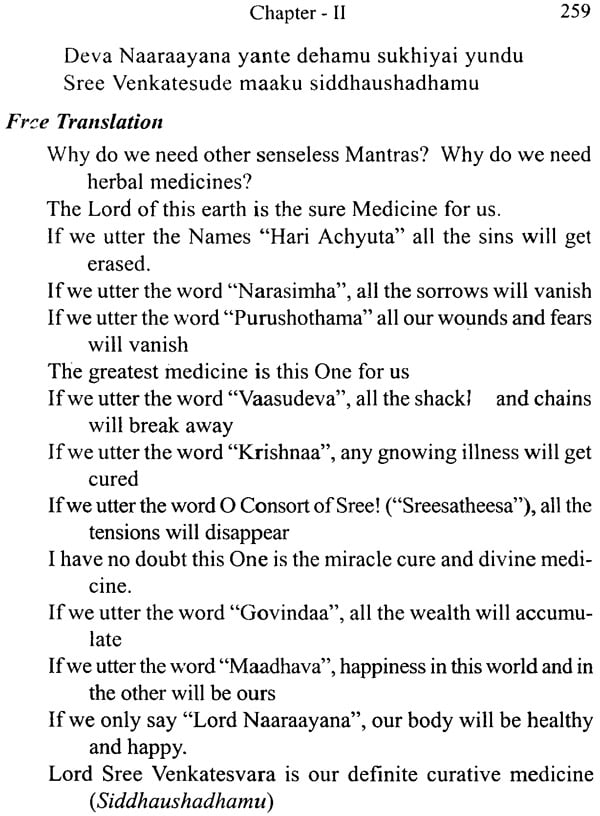
Spiritual Heritage of Annamacharya (Volume II)
Book Specification
| Item Code: | NAM476 |
| Author: | Prof. Dr. M. Narasimhacharya and Dr. Miss. M.S. Ramesh |
| Publisher: | Tirumala Tirupati Devasthanams, Tirupati |
| Language: | Transliteration with English Translation |
| Edition: | 2008 |
| Pages: | 270 |
| Cover: | Paperback |
| Other Details | 8.5 inch X 5.5 inch |
| Weight | 290 gm |
Book Description
Tallapaka Annamacharya was one of the greatest saint-composers of South India. His Soul-stirring sankirtanas on Lord Sri Venkateswara, the express his deep devotion to the Lord; the saint exuberantly sings His transcendental glory in his inimitable style. His adhyatma sankitanas are an eloquest tribute to the concept of prapatti emphasised by Sri Vedanta Desika and Ramanuja. The object of Annamacharya's poetry is not only spread the message of Bhakti towards the Lord of Seven Hills but also to establish integration of the whole man and to uphold spiritual and moral values.
The great savants and saints of our country visualised the concept of a loving personal God and emphasised pure devotion and simple faith as a sure means to the highest spiritual experience. The teachings of these pious souls been interwoven people. Their compositions, rich in poetry and sublime in exposition of philosophical truths rank high in world literature. Their devotional outpourings full of ardour and love reach the deepest recesses of our emotional and spiritual consciousness.
Among the renowned and mystics who showed us the pathway to Bhakti and God-realization, the name of Tallapaka Annamacharya shines like a vaggeyakara who lived in the sixteenth century blaxed a new trail in devotional poetry and gave a new vitality to bhajana sampradaya'. His intense devotion to Lord Venkateswara has few parallels in religious history. Annamayya's compositions in praise of the Lord of Tirumala are matchless for their sheer beauty of expression, enchanting music and devotional fervour. He can expound even the most esoteric spiritual ideas in elegant yet simple Telugu. Indeed, all his sankirtanas as the composer himself admits, are the exquisite flowers he offers endearingly to Lord Srinivasa.
The present book second volume of 'The Spiritual Heritage of Annama charya' is a collection of Annamacharya's sankirtanas translated into English by Dr. M.S. Ramesh and Sr. M. Narasimhachari. The translators effortlessly convey the essence of Annamacharya's devotional poetry and retain its Original charm. The book also contains an introductory chapter on the concept of Saranagati which given us an insight into the salient features of Vaishnava philosophy and metaphysical approach of Tallapaka Annamacharya. The translators deserve all praise for the meticulous care they have taken in translating the adhyatma sankirtanas of Annamayya with commendable ease and mastery in the interest of non-Telugu speaking readers.
I am extremely happy to dedicate this publication to the devotees of Lord Srinivasa.
This Volume is the follow up Volume to our earlier Book "Spiritual Heritage of Annarnacharya" published by Tirumala Tirupati Devasthanams in the year 2001. In that book, twenty-five Aadhyaatmika Sankeerthanas of the renowned Composer Sri Tallapaaka Annamacharya was presented in original along with a free translation of the said poems and a brief explanation of the significance of those poems.
In the previous book, there were two general Chapters, one dealing with the life history of Annamacharya and another comparing his philosophy and thoughts with those of the Alvars. In this book also we have presented as a general backdrop to the thoughts of Annamacharya a Chapter on the concept of Saranagathi which is a very basic tenet in Srivaishnavism. That is followed by presenting another set of 120 poems of Annamacharya with a free translation into English of those poems along with a brief explanation.
These 120 poems have been selected from Volume' I of the Aadhyaatmika Sankeerthanalu published by the Tiruma1a Tirupati Devasthanams. The Tirumala Tirupati Devasthanams have indeed done a very great service by publishing all the songs of Annamayya in a number of Volumes. As is well known, Annamacharya was initiated into Srivaishnava tradition by Sri Aadivan Sathagopa Jeer, founder of the Ahobala Math in 1398 AD. The poems of Annamacharya eloquently advocate the basic tenets of Srivaishnava religion and philosophy propounded by Sri Ramanuja in simple words which appealed to the minds and hearts of true devotees. As most of the poems of Annamacharya are in Telugu, they can reach a wider reading public only if they are translated into English. The earlier book written by us and published by the Tirumala Tirupati Devasthanams was the first attempt made by us when we collected just twenty-five poems of Annamayya and presented it in English. The format adopted by us was to first present the transliterated version of the Telugu poem. While presenting the transliterated version in Roman, we took a conscious decision to use popular spelling of the Telugu words and refrain from using the diacritical marks, because we felt that a majority of the English reading public is not familiar with the strict academic system of transliteration. Many, we hope, may find it easier to read the Telugu words in the present version. This transliterated version is then followed by a free translation of the said poem into English and wherever necessary, a brief explanation is also given. While presenting the explanation, an attempt has been made to compare, wherever possible, the expressions and ideas of Annamacharya with those found in the scriptures like the Upanishads, the Gita, the Pasurams of Alvars and the thoughts expressed by Srivaishnava Acharyas like Yamuna, Ramanuja and Vedanta Desika in their treatises. An attempt was also made, wherever possible, to stress on the similarities of the thoughts expressed by Annamayya with those of famous Telugu poets like Potana, Vemana, Ramadass and others.
We learn that Volume I which was published in 2001 had a good reception from the reading public inasmuch as the entire 2000 copies that were printed have almost been sold out. This response from the reading. public encouraged us to now present another set of 120 poems through this Book. We have indicated at the top of each poem the number which corresponds with that given by Tirumala Tirupati Devasthanams in their publication of Aadhyaatrnilca Sankeerthanalu, Volume I (A.S. Vo!. 1). This would enable those vho know Telugu to refer to the original, if they so desire.
We wish to place 60 record our grateful thanks to all the members of our family who consistently encouraged us in this venture of ours. Our special thanks are due to Dr. M.S. Lakshmikumari and Dr. M. S. Rajajee, from whose books, we have liberally quoted wherever necessary.
We wish to express our special thanks to Sri Ranganathan for the excellent secretarial assistance provided by him. The job was fairly heavy. But Sri Ranganathan did it in a willing and cheerful manner. What is more, he personally involved himself in this work with commitment as a true Vaishnava. On many an occasion, he also chipped in, drawing our attention to the Pasurams of Alvars which conveyed aimbst the same thoughts as those expressed by Annamacharya through his Telugu poems. Our special thanks are to him for the excellent secretarial assistance, as also the personal involvement which he showed in doing this work.
We wish to place on record our special thanks to Mr. Ramji, who is working as a Commercial Tax Officer in the Government of Tamil Nadu. Because of his love of the subject, he was kind enough to come on holidays and extended excellent secretarial assistance.
We sincerely feel that but for the Blessings of the Lord of the Seven Hills, we could not have undertaken this work. We do hope and pray that readers of this book will derive as much satisfaction as we did in understanding the deep, fervent devotion which Annamacharya had in the Lord of the Seven Hills. We pray that Lord Srinivasa showers His bountiful Blessings on all the readers.
| Foreword | ||
| Preface | ||
| Chapter One | Concept of Saranagathi | |
| Chapter Two | Songs of Annamacharaya - Adhayatmika Sankeerthanalu volume-1 (121 songs) | |
| Song Starting with | ||
| 1 | Heena dasala bondhi itla nundutakante | 3 |
| 2 | Adio alladivo hari snaanamu | 23 |
| 3 | Nadulolladivo naa snaanamu kadu | 51 |
| 4 | Chaaladaa harinaama saukhyaamritamu tamaku | 52 |
| 5 | Nee kathaamritamu nirata sevana naaku | 54 |
| 6 | Emi seyavacchu garmamicchinante kaani, ledhu | 55 |
| 7 | Patta vasamugaani baaludaa penu | 58 |
| 8 | Ee paadame kadaa ilayella kolachinadi | 66 |
| 9 | Alara chanchalamaina aatmalandu unda nee | 67 |
| 10 | Ghora vidaarana naarasimhaa nee | 68 |
| 11 | Nela minnu nokkatainaneebantu vokka | 69 |
| 12 | Evvado gaani eragaraadhu kadu | 74 |
| 13 | Aadhimapoorushu dachythu dachalu danathun damaludu | 80 |
| 14 | Ilayunu nabhamunu eka roopamai | 85 |
| 15 | Itharamu linniyunemitiki | 86 |
| 16 | Endaaka nechithamethalapo | 88 |
| 17 | Ooriki boyedi vothadaa kadu | 89 |
| 18 | Akkada naapaatlu vadi ikkada neepaatu padi | 90 |
| 19 | naatiki naade naachadhuvu | 91 |
| 20 | Itu garudani nee vekkinanu | 92 |
| 21 | Eee sura leemunu leecharaacharamulu | 93 |
| 22 | Etiki talakeda rindarunu | 101 |
| 23 | Vaade Venkatesudane vaade veedu | 121 |
| 24 | Chooda jooda maanickyaalu chukaluvale nunnavi | 133 |
| 25 | Pankajaakshulu solasi paliki nagagaa | 138 |
| 26 | Bhogi sayanamunu busakottedini | 139 |
| 27 | Edhi choochinanu gadu nituvanti chodyamule | 140 |
| 28 | Sulabhamaa manujulaku Hari Bhakti | 144 |
| 29 | Kondalalo nelakonna koneti raayudu vaadu | 151 |
| 30 | Aakati velala nalapaina velalanu (Hari Nama Mahima) | 158 |
| 31 | Emee neragini mammu nekkuva sesi | 162 |
| 32 | Bruvanthi bauddhaa Buddha ithi | 164 |
| 33 | Satatam Sreesam | 165 |
| 34 | Emi valasina nichchu neppudainanu | 172 |
| 35 | Chakramaa! Hari Chakramaa! | 183 |
| 36 | Thane kaaka evvaru maaku daatbayu daivamu thana- | 192 |
| 37 | Verapulu norapulu vrithaa vritbaa | 217 |
| 38 | Emi galigenu maa kinduvalana | 218 |
| 39 | Sakala bhoothadaya chaalaga kaluguta | 223 |
| 40 | Ade Choodu Tiruvenkataadri naaluguyugamu- | 227 |
| 41 | Neevanaga nokachota nilichiyunduta ledhu | 232 |
| 42 | Konaro Konaro meeru koorimi mandhu | 237 |
| 43 | Katakata itu chese karma baadha | 239 |
| 44 | Neevekaa cheppajoopa Neeve neevekaa | 255 |
| 45 | Aapannula paali daivamaathade Gathidakka | 266 |
| 46 | Nee mahattvambu loniki velupaliki gappi | 270 |
| 47 | Adhi Naayaparaadha midi naayaparaadhamu | 271 |
| 48 | Ettivaarikinella nitti karmamulu maa | 277 |
| 49 | Annichotla paramaathmaa neevu | 278 |
| 50 | Hari golichiyu maree naparamulaa? | 290 |
| 51 | Eekulajudemi evvadaina nemi | 292 |
| 52 | Telisina teliyudu, teliyanivaaralu | 317 |
| 53 | Ekkuva kulajudaina heena kulajudaina | 318 |
| 54 | Kanugonaga jeevuderagadugaaka eriginanu | 319 |
| 55 | Veedivo idhe vinthadonga | 322 |
| 56 | Kaakunna Samsaara gathulela | 326 |
| 57 | Konchemunu ghanamu ganugona nela Hari dalachu- | 329 |
| 58 | Chaaladhaa Brahmam idhi Sankeerthanamu meeku (Hari Nama Mahima) | 343 |
| 59 | Sakala samghrahamu Sakala sanchayamu (Hari Nama Mahima) | 349 |
| 60 | Naaraayanaaya Namo Namo, Naanaatmane Namo Namo | 380 |
| 61 | Antaryaamee alasithi solasithi | 381 |
| 62 | Abhayam Abhayam O Hari! neevu | 383 |
| 63 | Kondharikivi sammathi yaithe kondharikavi gaavu | 384 |
| 64 | Antayu neeve Hari Pundareekaakshaa | 385 |
| 65 | Annitaa neevu antaryamivi avuta dharrname ayinaanu | 386 |
| 66 | Veeni choochi aina memu virathi bondhaga lemu | 388 |
| 67 | Panimaalinatti vatti paradhugaaka maaku | 389 |
| 68 | Parula sevalu sesi brathikerataa | 390 |
| 69 | ltugana sakalopaayamu ludigina Eesvarude rakshakudu | 391 |
| 70 | Raama Raamachandra Raaghavaa! Raajeeva-lochana Raaghavaa! | 392 |
| 71 | Vidhi nishedamulaku veravaga paniledhu | 393 |
| 72 | Sulabhudu Madhusoodhanudu mana- | 394 |
| 73 | Kinka deera "na daivam Kesavaat param" ani | 395 |
| 74 | Oho "dern" "dem" yogi brahma midiyani | 396 |
| 75 | Chee Chee narula detijeevanamu | 397 |
| 76 | Inthe maremi ledu indhumeedanu | 398 |
| 77 | Itara Dharmamu landhu nindhu kaladaa | 399 |
| 78 | Devadevudekke nade divyarathamu | 400 |
| 79 | Marigi veerepo maadaivambulu | 402 |
| 80 | Emee naduganolla hechchu-kundulana nolla | 403 |
| 81 | Kaniyu gaanani manasu kadamagaaka | 404 |
| 82 | Valenanu vaaridhe Vaishnavamu idi | 405 |
| 83 | Sree Hari sesina chihna livi ee | 406 |
| 84 | Sarvaantaraatmudavu saranaagatuda nenu | 409 |
| 85 | Bhakti koladhivaade paramaatmudu | 410 |
| 86 | Mikkili punyulu Hari! mee daasule Hari! | 411 |
| 87 | Cheppinanthapani ne jeyagalavaada ninthe | 412 |
| 88 | Verrivaadu verrigaadu Vishnuni daasyamu leka | 413 |
| 89 | Nityulu muktulu nirmalachitthulu nigamaantha-vidulu Vaishnavulu | 414 |
| 90 | Idhiye marmamu Hari indhugaani lonugaadu | 418 |
| 91 | Evvarivaado ee dehi | 419 |
| 92 | Enta vichaarinchu konnaa idhiye tattvamu Hari | 420 |
| 93 | Vaade Venkataadri meeda varadaivamu | 422 |
| 94 | Sulabhamaa indariki jooda sulabharnu gaaka | 423 |
| 95 | Adhe vaade idhe veede Andhu nindu negeeni | 424 |
| 96 | Sree Venkatesudu Sreepathiyu ithade | 425 |
| 97 | Pattina chone vedaki bhaavinchavalegaani | 426 |
| 98 | Naatappu logonave nannu gaavave Deva | 427 |
| 99 | Viveka meragani verrulamu gaaka nemu | 429 |
| 100 | Emiyujeyaga vaddu inthalone mokshamu | 430 |
| 101 | Sahajaachaaramulella sarvesvaruni yaajne | 431 |
| 102 | Hari! Neeyanumatho adi naa lkarmamo? | 433 |
| 103 | Deva ee thagavu dheerchavayya | 435 |
| 104 | Antarangamella Sree Hari koppinchakundithe | 437 |
| 105 | Apadbhandhudu Hari maaku galadu | 439 |
| 106 | Irvagu vaariki iha paramidiye | 439 |
| 107 | Unna vichaaramu lela oho samsaarulaaraa! | 441 |
| 108 | Kaliginadi yokkate Kamalaapatiseva | 442 |
| 109 | Kantinide yarthamu ghana saastramulu davvi | 443 |
| 110 | Athanine ne kolichi nenandithi bo nija sukhamu | 444 |
| 111 | Saivamu neeve gati maa tappulu paniledu | 445 |
| 112 | Mariyu matiyu nive maa panulu | 446 |
| 113 | Marali marali jaya mangalamu | 448 |
| 114 | Kaladi galatte karmaphalambulu | 450 |
| 115 | Pendu moolikalu reyi pagalu nunnavi | 452 |
| 116 | Neva Naarasimha namo namo | 453 |
| 117 | Anganalaala manache naadinchukonegaani | 454 |
| 118 | Neevelikavu maaku, nee daasulamu memu | 455 |
| 119 | Akkarakodaganiyatti yarthamu | 456 |
| 120 | Pattinadella Brahmamu | 457 |
| 121 | Veda mantram ika nela - veru vellankulu nela | 461 |
